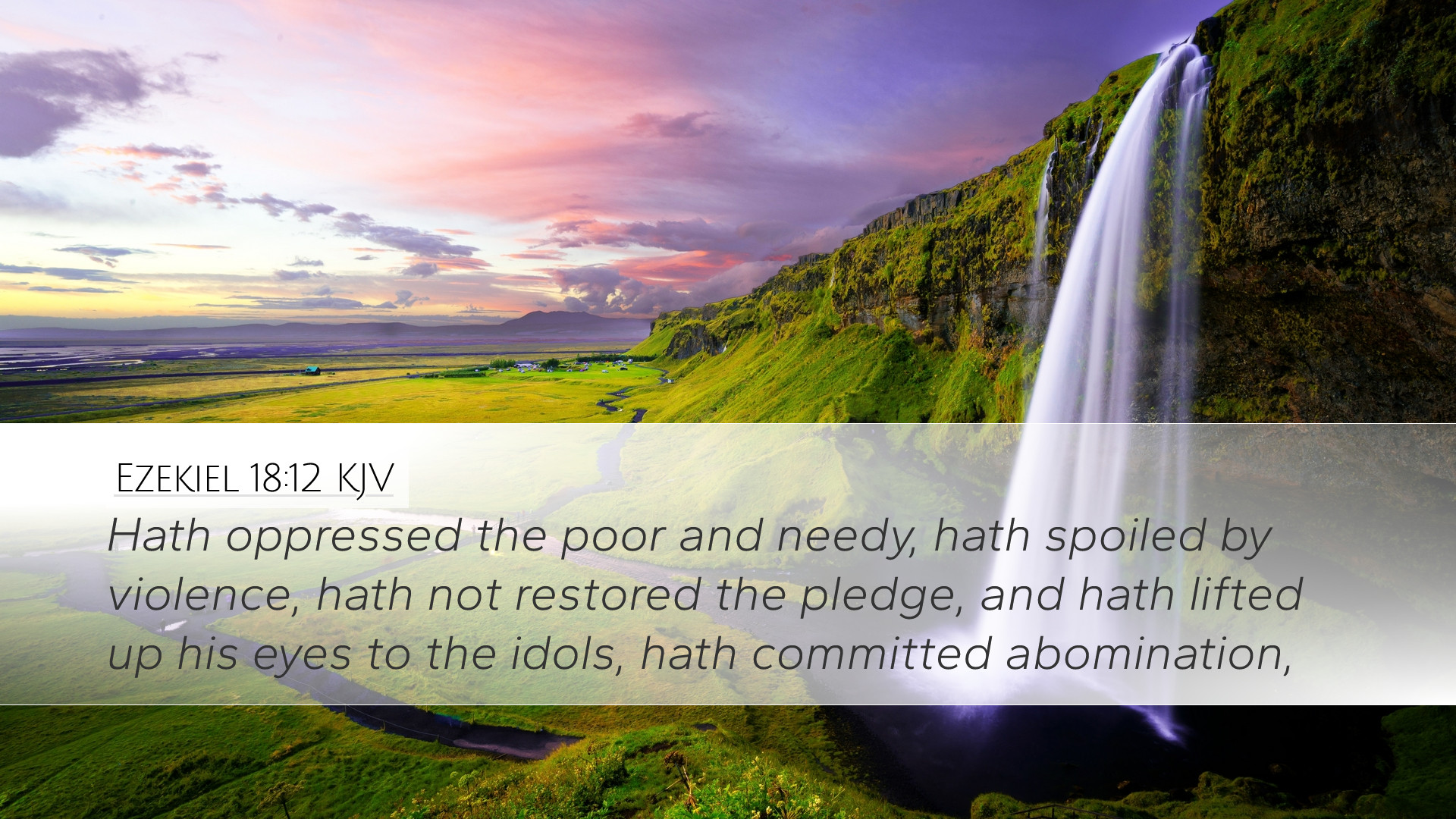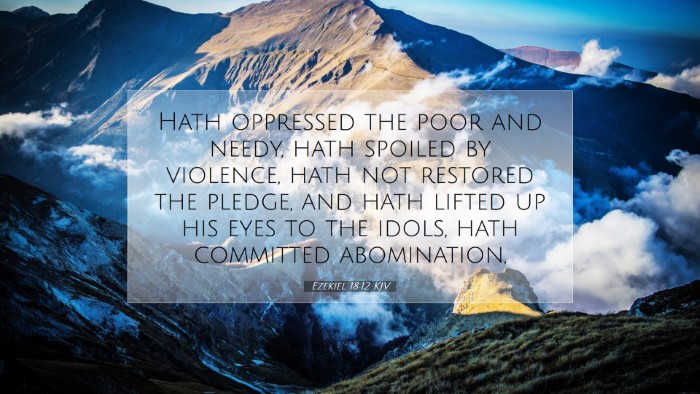Commentary on Ezekiel 18:12
Ezekiel 18:12 states:
"He hath oppressed the poor and needy, hath spoiled by violence, hath not restored the pledge, and hath lifted up his eyes to the idols, hath committed abomination." (KJV)
This verse paints a vivid picture of the moral and social decay present in the lives of individuals who stray from God’s commands. Below is a synthesis of insights from Matthew Henry, Albert Barnes, and Adam Clarke, aimed at providing a deeper understanding suitable for pastors, students, theologians, and Bible scholars.
Contextual Background
The chapter focuses on the principles of individual responsibility for sin, contrasting the behavior of the righteous and the wicked. The context around Ezekiel 18 establishes a theological underpinning that teaches personal accountability before God, which is vital in interpreting the transgressions listed in verse 12.
Analysis of Phrases
-
"He hath oppressed the poor and needy"
This phrase emphasizes the social injustice that constitutes a grave sin in the eyes of God. Matthew Henry notes that exploitation of the vulnerable is a clear departure from the commands to love one’s neighbor and uphold justice.
-
"Hath spoiled by violence"
This refers to acts of violence that result in loss and suffering for others. Albert Barnes highlights how such violence doesn't simply indicate physical harm but encompasses a wider range of unjust actions that harm the community's well-being.
-
"Hath not restored the pledge"
The failure to restore a pledge signifies a breach of trust and integrity. Adam Clarke points out that the Hebrew culture placed great emphasis on oaths and promises; thus, this act reflects a profound dishonesty.
-
"Hath lifted up his eyes to the idols"
This illustrates a turn towards idolatry, which is seen as both a spiritual betrayal and a moral failing. Henry observes that idolatry leads to a plethora of other sins, providing a foundation for a corrupt life.
-
"Hath committed abomination"
Commitment to abominations represents not only the acts themselves but also a heart that has willingly turned away from God. Barnes elaborates on how these deeds are an affront to divine holiness.
Theological Implications
This verse serves as a microcosm for the larger themes within Ezekiel's prophetic messages regarding repentance and restoration. Ezekiel articulates that such actions not only damage one's relationships with others but fundamentally sever one’s relationship with God, leading to spiritual death.
Personal Responsibility
The overarching theme of personal accountability resonates throughout Ezekiel 18. Each individual is responsible for their actions, a stark reminder of God’s justice and the call for each believer to maintain integrity. Henry emphasizes that each generation needs to reflect upon their own actions without relying on the righteousness or sins of their predecessors.
Call to Repentance
The prophet's call for the people implies that recognizing such transgressions and turning away from them is essential for healing and restoration. Clarke notes that genuine repentance involves not just a sorrow for sin but a decisive turn towards righteousness and a commitment to ethical living.
Practical Applications
For pastors and theologians, this passage offers rich material for preaching. It challenges congregations to reflect on their social responsibilities and personal ethics. Key applications can include:
- Upholding Justice: Actively advocate for the marginalized and uphold the principles of equity in community dealings.
- Spiritual Vigilance: Encourage an examination of heart attitudes to identify any form of idolatry in daily life, emphasizing that devotion should solely be towards God.
- Integrity in Conduct: Teach the importance of fulfilling commitments and restoring trust in personal and communal relationships.
- Repentance as a Lifestyle: Cultivating an ongoing culture of repentance where the congregation is reminded of God’s call for renewal and transformation.
Conclusion
Ezekiel 18:12 serves not only as a warning but also as an invitation to righteousness. It encapsulates profound truths about justice, integrity, and the dangers of idolatry. By examining the implications of this verse, believers are urged to strive for a life that honors God, supports the vulnerable, and embodies the transformative grace found in repentance.


